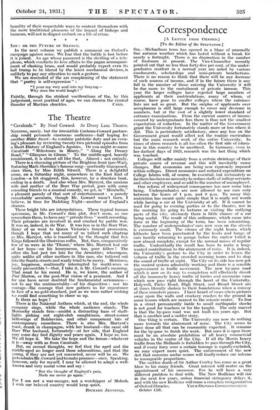The Theatre
"Cavalcade." By Noel Coward. At Drury Lane Theatre.
NOTTING, surely, but the irresistible Cochran-Coward partner- ship could persuade enormous audiences—half hoping for another Bitter Sweet—to combine patriotic duty and an even- ing's pleasure by reviewing twenty-two pictorial episodes from a Short History of England's Agonies. Or you might re-name Cavalcade " Milestones in Misery," " Along the Dreary - Road," " Glimpses in Gloom." To the middle-aged, heavily reminiscent, it is almost all like that. Almost : not entirely. There is a charming picture of the Brighton front (pre-War), featuring Mark Sheridan's famous song—poetically transposed, since then, by Miss Edith Sitwell. There is a delightful scene, on a Saturday night, somewhere in the East End of London—a bit staggered, this, however, by a drunken bout, ending in a death. And also when Mrs. Marryot, the anxious wife and mother of the Boer War period, goes with some consoling friends to a musical comedy, we get, in ` Mirabelle," a pleasant parody of that sort of entertainment : a parody remarkably accurate, though Mr. Coward wasn't born, I believe, in time for Mafeking Night—another of England's shames.
These bright bits are interpolations. These typical human specimens, in Mr. Coward's thin plot, don't seem, as one remembers them, to have any " private lives " worth recording. Their privacies are involved in and crushed by public woe. It was so, indeed, in the War. It was less so in the Boer War. Many of us went to Queen Victoria's funeral procession, though I hope that not many of us talked such claptrap as Mrs. Marryot, who is transfixed by the thought that five Kings followed the illustrious coffin. But, then, comparatively few of us were in the `Titanic,' where Mrs. Marryot lost one of her boys—on his honeymoon, too, poor fellow ! The other she lost just too late for the Armistice; whereupon, quite unlike all other mothers in like case, she tottered out into the frantic streets and wanly tried to be merry. Merriness, joy, happiness, continually interrupted by world-woes so easily preventible !—that, I take it, is Mr. Coward's meaning. That must be his moral. He is, we know, the author of Post Mortem, or the post-War vision of a pessimist. And I for one have never doubted the fundamental seriousness— not to say the sentimentality—of his disposition : nor his courage—the courage that now gathers us for repentance in face of a no-gold-standard, just as we were rather wishing we could find something to cheer us up.
Is there no hope ?
There is the National Anthem which, at the end, the whole company sings, while the whole audience stands. The Monarchy stands firm—amidst a distracting haze of shaft- lights picking out night-club naughtiness, street-corner bellowings of Bolshevism, and other component bits of contemporary cussedness. There is also Mrs. Marryot's toast, drunk in champagne, with her husband—the same old Boer War husband, fortunately—at her side, that England may some day find dignity and peace again. I hope so, too. We all hope it. We take the hope and the lesson—whatever it is—away with us from Cavalcade. But, on second thoughts, we feel that the aged and the middle-aged no longer need these admonitions, and that the young, if they are not yet converted, never will be so. We got° admireMr. Coward and to make penance—once. Speaking, however, only for myself, I may be allowed to adapt a well- known and very moral verse and say :
" But the thought of England's pain, Made me never go again."
For I ant not a war-monger, not a worshipper of Moloch. I wish our beloved country would keep quiet.
RICHARD JENNINGS.














































 Previous page
Previous page